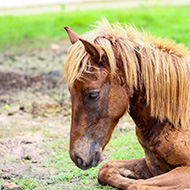
The cause of the often-fatal disease remains a mystery.
Leading scientists with no previous experience of Equine Grass Sickness (EGS) gathered in Edinburgh on Thursday (24 March) for a day exploring new approaches to the disease.
Experts from across the fields of veterinary immunology, genetics, and molecular biology met with an array of environmental scientists for a day of discussion and debate at the Moredun Research Institute.
The participants listened to talks from experts in EGS for more than eight hours before being grouped into their various disciplines to identify new areas of research.
Event organiser and Moredun’s principal investigator, Dr Beth Wells, said: “Bringing together so many disciplines in one room, for one day, to discuss an animal disease they have no previous knowledge of is unique.
“Their input is a game-changer in terms of generating new areas of research or new technologies that can revive previous research. The Equine Grass Sickness Fund needs more funding to support research in new areas. We appeal to the industries that benefit from equine ownership and sport to provide the funding we need to bring an end to the misery of Equine Grass Sickness.”
Equine Grass Sickness is the most devastating disease affecting horses, but its cause remains a mystery.
Healthy sport, leisure and family horses might be discovered dead in their fields and stables without explanation. In some circumstances, horses develop depression, which rapidly leads to an inability to swallow and digest forage.
Kate Thompson, from the Equine Grass Sickness Fund, shared her optimism that EGS can become a disease of the past.
“I am so grateful for Moredun Research Institute taking a lead with such an innovative and productive event,” she said. “I genuinely feel we are at the beginning of the end of a century of research to find a solution to something that is the worst fear of every horse owner.”



 The Animal and Plant Health Agency (APHA) has updated its online reporting service for dead wild birds.
The Animal and Plant Health Agency (APHA) has updated its online reporting service for dead wild birds.